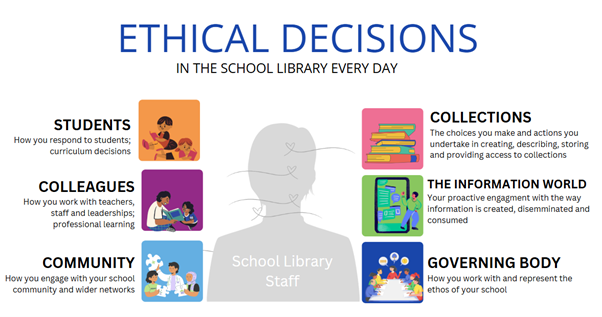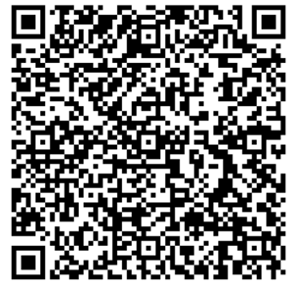Issue 134
Term 3, 2025
Putting the ALIA Code of Ethics into practice in school libraries
SCIS has long supported ALIA and its work. With the release of the new ALIA Code of Ethics, ALIA Schools has created a template to help school library staff apply the code in their own settings. This article looks at how the template can support daily decisions, advocacy and reflection.
Have you ever actively sought out resources to support a specific student’s interest or identity? Or discussed copyright issues with a colleague? Do you champion reading for enjoyment? Perhaps you’ve taken action to ensure that student and staff information is protected on your library management system or created a feedback survey for your school library. These are examples of behaviours that occur every day in school libraries around Australia, yet they are all part of something much bigger. As people who work in libraries, we are part of a huge global library family, all united by the ethics and values that form the basis of the trust granted by the communities we serve. Since 2012, the International Federation of Library Associations and Institutions (IFLA) has had the Code of Ethics for Librarians and Other Information Workers, which provides a reference for professional conduct. In 2024, the Australian Library and Information Service (ALIA) used to IFLA code as a basis for development of its ALIA Code of Ethics for the Australian Library and Information Services Workforce. The ALIA code has been developed for the Australian context, including language and Aboriginal and Torres Strait Islander priorities and responsibilities that are specific to Australia and its communities.

One of ALIA’s many wonderful special interest groups, ALIA Schools, has recently undergone a restructure to include project working groups. Through this initiative they have created an amazing tool so school library staff can customise action examples in the ALIA Code of Ethics for their school library. The Template for school libraries is a document designed to bring school libraries into the spotlight and support school library staff in feeling connected to the wider library and information workforce.
Use the template to guide professional conduct and policy
At a time where responsibilities can be uncertain, having a Code of Ethics can help you to articulate to others the principles that sit at the centre of your professional practice and identity. It gives you the words to talk about your role, to advocate for yourself, and clarify what you as a qualified information professional bring to the library role.
The Code of Ethics is a tool for professional growth and reflection. Reading through the action examples that ALIA Schools has provided in the document, you can evaluate what you are already doing well and where there might be areas for improvement. Where might you need to seek additional training? Perhaps the action examples might spark new ideas for programs and services for you!
Where a Code of Ethics is most important, though, is when it comes to day-to-day decision-making. It’s a guiding star when it comes to our professional conduct and forming library policies as it helps to answer the question, ‘What should I do in this circumstance?’
Clear articulation of the educational role of school libraries
Decision-making is all around us in the school library and one of the great things about engaging with the ALIA Schools Code of Ethics template is that it elevates us professionally by reminding us of the core tenets of our profession. Strong and respectful relationships are our bedrock in challenging times and awareness of the code has the potential to shift culture by informing how we respond to students and interact with colleagues; what we choose to prioritise in the library curriculum; and how we engage with the school community.
The ethical decisions we make around collections, cataloguing and access are our professional bread and butter, so integral to the Code of Ethics are the actions undertaken in creating, describing, storing and providing access to resources. Having this work made visible in the action examples of the template promotes the need for qualified staff in libraries.
The school library plays a vital role in helping its community make decisions about how they interact with the overloaded and increasingly complex information world. Having a school-branded Code of Ethics is a key advocacy tool to highlight the educational role of the school library.
Over to you
Now it’s over to you as school library staff to engage with the ALIA Schools template and create action examples for your library. ALIA Schools has provided a list of hints and tips on the first page of the document, including starting with what you or your team or school library network are already doing well.

Read the ALIA Code of Ethics
By engaging with the document, the hope is that you will recognise and connect with a foundation for strengthening your professional identity, for nurturing your library identity and, through your active practice, feel a sense of connection to the ethics of the library workforce more broadly. And best of all, your school community will benefit from access to a school library where ethical professional conduct and practice are upheld.